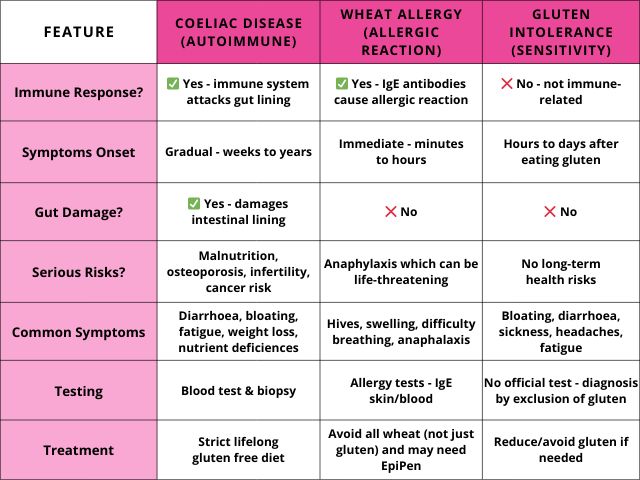Gluten Intolerance (NCGS)
Exploring gluten sensitivity outside of coeliac disease



Fast Facts:
⚡ Gluten intolerance (NCGS) is a sensitivity to gluten (wheat, barley, rye) that causes discomfort but not intestinal damage like coeliac disease
⚡ Symptoms can include bloating, fatigue, brain fog, headaches, joint pain, mood changes, skin issues
⚡ Anyone can develop it, but it's more common in women, those with digestive disorders, or family history of gluten-related conditions
⚡ Diagnosis is based on symptom relief after removal and then reintroducing gluten
⚡ At-home tests are unreliable - see a doctor or dietitian instead
⚡ Living with NCGS can still be tough, even if it doesn't cause long-term health problems
❓ What Is Gluten Intolerance?
A food intolerance is when your body has difficulty digesting certain foods. It's not usually dangerous, but it can make you feel very unwell.
Gluten intolerance, also called non-coeliac gluten sensitivity (NCGS), is a condition where your body reacts negatively to gluten - the protein found in wheat, barley, and rye. Unlike coeliac disease, NCGS doesn't cause autoimmune damage to the small intestine, and unlike a wheat allergy, it doesn't involve a life-threatening allergic reaction. But it can still trigger a range of distressing symptoms.
🆚 Quick comparison:
- Coeliac disease - An autoimmune reaction where gluten damages the gut lining
- Wheat allergy - An allergic immune response to proteins in wheat (can cause anaphylaxis)
- Gluten intolerance - A non-immune sensitivity that causes discomfort but not intestinal damage

❗ First: Rule Out Coeliac Disease
If you suspect gluten is causing problems, it's important to get tested for coeliac disease before removing gluten from your diet. Going gluten free too early can affect test results and make diagnosis more difficult.
👉🏽 Click here to read more about testing for coeliac disease
Both conditions involve avoiding gluten, but the long-term risks and level of strictness differ:
- People with coeliac disease must strictly avoid even tiny traces of gluten to prevent long-term health issues
- People with NCGS may tolerate small amounts, depending on their sensitivity
Understanding the difference can help you avoid unnecessary dietary restrictions and manage your health more effectively.
🤢 Symptoms of Gluten Intolerance
Symptoms vary between individuals and can last for hours or even days. Common ones include:
- Digestive issues - Bloating, gas, diarrhoea, constipation, nausea, stomach pain
- Fatigue - Feeling extremely tired, even after a full night's sleep
- Headaches - Frequent or migraine headaches
- Brain fog - Poor concentration, forgetfulness, sluggish thinking
- Joint and muscle pain - Unexplained aches, inflammation, or stiffness
- Skin issues - Rashes, eczema, or acne-like breakouts
- Mood changes - Anxiety, irritability, or low mood
You might already have spotted that these symptoms are very similar to those of coeliac disease, which is one reason why the two conditions are often confused - or misdiagnosed. It's possible for someone to think they have a gluten sensitivity when they actually have coeliac disease (or the other way round), especially if they haven't been properly tested.
👉🏿 Read more about the symptoms of coeliac disease
🤷 Who Can Get Gluten Intolerance?
Anyone can develop gluten intolerance at any stage of life. It's:
- More common in women than in men
- More likely if you have a family history of coeliac disease or gluten sensitivity
- Associated with other gut conditions, such as irritable bowel syndrome (IBS) or leaky gut
🧬 What Causes Gluten Intolerance?
The exact reasons as to what causes gluten sensitivity aren’t clear, but likely factors include:
- Genetics - A family history of food sensitivities
- Gut health - Imbalances in the microbiome or digestive disorders
- Environmental triggers - Illness, infections, or emotional stress
- Dietary habits - Excessive or repeated gluten intake over time
🧑⚕️ How Is It Diagnosed?
There is no official test for NCGS, diagnosis is based on what happens when you remove and reintroduce gluten (after you have tested negative for coeliac disease):
- Elimination phase - Remove gluten for several weeks and track symptoms
- Reintroduction - Gradually eat gluten again and monitor for a return of symptoms
- Food and symptom diary - Helps spot patterns and identify specific triggers
A GP or dietitian may recommend this process and guide you through it safely.
🏠 A Note on At-Home Tests
Many commercial food intolerance tests are not supported by science and may give false or misleading results. They often suggest avoiding multiple foods unnecessarily, which can harm your health and relationship with food.
Always speak to your doctor or a registered dietitian before changing your diet.
⛔ How Is It Treated?
Treatment usually involves adjusting your diet to reduce or avoid gluten:
- Eliminate gluten-containing foods - Wheat, barley, rye
- Choose naturally gluten free options - Fruits, vegetables, rice, corn, dairy, legumes, quinoa, buckwheat
- Read food labels carefully - Gluten can hide in sauces, snacks, and processed foods
💗 Living with Gluten Intolerance
Managing gluten intolerance can feel a lot like living with coeliac disease - and can be just as emotionally and socially challenging, even if the health risks aren't as severe. The difference? Flexibility.
Those with gluten intolerance may be able to:
- Tolerate small amounts of gluten without severe symptoms
- Navigate social events and eating out with more ease
- Be less affected by cross-contamination
- Reintroduce gluten over time if symptoms change
That said, many people with NCGS still experience daily discomfort, social anxiety around food, or confusion when symptoms don't follow a predictable pattern. Your experience with gluten intolerance is real, valid, and deserves support.
👉🏻 Read more about the differences between coeliac disease and gluten intolerance
🎯 Quick Recap:
Gluten intolerance might not cause lasting damage, but it can still have a significant impact on daily life. The symptoms are real, and managing them takes time, patience and support. Many assume that a non-coeliac gluten sensitivity is less serious or just a fad - but for those living with it, the symptoms are anything but minor. It deserves to be taken seriously and treated with the same respect as any other condition. Whether you're highly sensitive or fall somewhere in the middle, the most important thing is learning what works for your body.